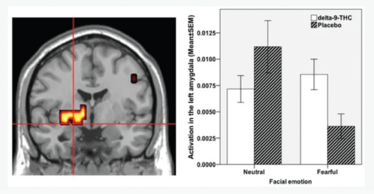Fear and Loathing
How epigenetic variation could influence the effects of THC

It’s no secret that different people respond differently to the effects of THC. Genetics clearly plays a role, but it gets very complex, very quickly. In a recent study, a multidisciplinary team of European researchers delved into just one genotype – the single nucleotide polymorphism (SNP) rs1130233 at the protein kinase AKT1 gene – a key component of the dopamine signaling cascade. In particular, they wanted to understand how epigenetic methylation around this SNP affects AKT gene expression and, in turn, the acute effects of THC on brain function – specifically, fear processing (1).
In the double-blind, randomized placebo-controlled trial, the team administered THC to 36 healthy male participants. The men were also assessed under functional magnetic resonance imaging (fMRI). They found that THC caused an increase in anxiety and transient psychotomimetic symptoms and para-hippocampal gyrus/amygdala activation. Interestingly, the number of A alleles at the AKT1 rs1130233 SNP and the percentage methylation at the CpG11–12 site were independently associated with a greater effect of THC on activation in a network of brain regions.
The findings help shed some light on how genetic and epigenetic variation influences the psychotomimetic and neurofunctional effects of THC. We spoke with Grace Blest-Hopley to find out more.

With Grace Blest-Hopley, Research Director at Heroic Hearts Project and Postdoctoral Researcher at King’s College London, UK
What was your starting point for the study?
We knew that the coding variation of SNP rs1130233 had been linked to differential expression of the AKT protein – and that the AKT protein modulates the acute effects of THC from our previous studies – (2, 3). We decided to build on these previous findings and explore how symptoms and activation under the influence of THC was affected by genetic and epigenetic variation.
Is there a difference between fear-related brain activity and associated anxiety-like behavior?
Fear and anxiety are related emotional states though there are some differences between them. For example, it has been suggested that fear is related to a known external threat, while anxiety may be related to an unknown threat, uncertainty, or some sort of mental conflict. However, there is clearly an overlap of the brain substrates involved in fear and anxiety. As such, effects of THC on brain substrates involved in fear processing have been shown to correlate with anxiety symptoms measured under its influence under experimental conditions.
How do these findings build on what we already know about the influence of genetic variation on the effect of THC?
As cannabis and cannabinoid use is entering a new era, the need to understand why people respond differently to them is becoming increasingly apparent. Our study begins to suggest a further level of complexity in our understanding of what may underlie differences between individuals in response to cannabis. Our environment and behaviors can cause epigenetic alterations. These epigenetic alterations can in turn influence the way our genes work by turning them “on” or “off.” In essence, our present study suggests that epigenetic alterations that are linked to previous experiences or behaviors may also influence the effects of THC.
You suggest the THC-induced increase in brain activation may represent a genetically-mediated lack of efficiency in processing emotion. Could you tell us more about this?
To be clear, we have stated this is just one of the possible explanations for the results that we have reported, rather than an empirical observation. Future work is needed to investigate this further...
Were there any limitations to the study?
Our main limitation was the size of the sample; we would most certainly want to find funding for a further study in a much larger population. Other limitations are outlined in the paper but another one to note here was the use of only male subjects, which limits the application of our findings. That said, focusing on a single sex allowed us to detect an effect – even with such a modest sample size.
If you were to repeat the research with men and women, would you expect to see methylation manifest differently across genders?
We have seen evidence that the effects of cannabis and THC do appear to be different between the sexes. Therefore, it would be important to examine whether methylation is one of the drivers behind this. It’s too early to predict anything at this point, but, as with many other aspects of cannabis’ effects, knowing what might underlie differences between sexes is vital if we are to apply our findings to the wider population.
- G Blest-Hopley et al., “Epigenetic Mediation of AKT1 rs1130233’s Effect on Delta-9-Tetrahydrocannabinol-Induced Medial Temporal Function during Fear Processing”, Brain Sci, 11, 1240 (2021). DOI: 10.3390/brainsci11091240
- S Bhattacharyya et al., “Protein kinase B (AKT1) genotype mediates sensitivity to cannabis-induced impairments in psychomotor control”, Psychol Med, 44, 3315 (2014). PMID: 25065544
- S Bhattacharyya et al., “Preliminary report of biological basis of sensitivity to the effects of cannabis on psychosis: AKT1 and DAT1 genotype modulates the effects of δ-9-tetrahydrocannabinol on midbrain and striatal function.” Mol Psychiatry, 17, 1152 (2012). PMID: 22290123












